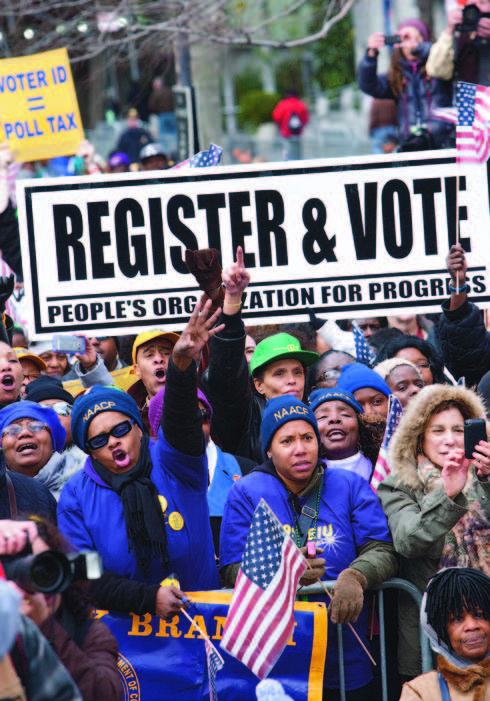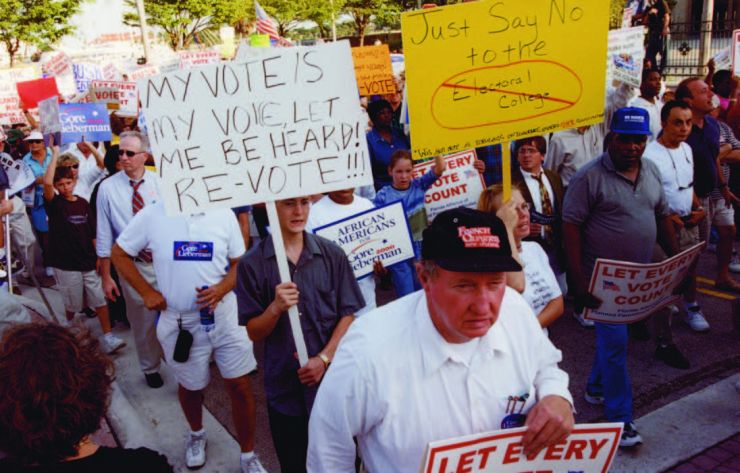Voting Rights Expanded
October 22, 2024
1199 has fought to expand access to the ballot box throughout its history.

Women won the right to vote in 1920, just 12 years before the Union was founded. Although the right to vote had been extended to Black men 50 years earlier with the passage of the 15th Amendment in 1870, blatant injustices such as state laws, grandfather clauses, poll taxes, literacy tests and outright terrorism prevented millions of people of color from actually exercising their voting rights in practice. That’s why the passage of the Voting Rights Act (VRA) in 1965 was so crucial to ensuring true universal suffrage. The VRA was among the most effective pieces of civil rights legislation in U.S. history.
This act did not come out of nowhere, however. 1199ers had sided with political efforts more than a generation earlier. For example, when a 1942 bill to abolish poll taxes was stalled in a U.S. House committee, NY Rep. Marc Antonio, a staunch ally of 1199, forced the bill onto the House floor for a vote. The bill passed, but was later killed in the Senate.
In 1950, Local 1199 established a Solidarity Fund. Most of its proceeds went to organizations fighting for civil and voting rights. In 1959, during 1199’s hospital organizing campaign, Thurgood Marshall, the foremost civil rights attorney in the nation, addressed 1199ers at its annual Negro History Week and praised the union for “what could well be one of the most important organizing campaigns this city has ever seen.”
As the voting rights campaigns gathered steam over the next decade, so did 1199’s involvement. Close to 1,000 members attended the historic 1963 March on Washington for Jobs and Freedom. The union also supported other actions that were vital to the passage of the VRA, including the 1964 Freedom Summer project in Mississippi and the three Selma to Montgomery marches in 1963.
1199’s first union organizing attempt in the South did not result in a union representation victory in Charleston, South Carolina, but the campaign did help Black residents recognize their power. Black voter reregistration skyrocketed after the 1969 campaign, leading to the election of African Americans to the state legislature. In the next decade, Black representation on the Charleston City Council jumped from one member to six.
Northern states like New York also required VRA protections. In 1968, voter registration among Spanish-speaking New Yorkers, some of them 1199ers, was so low that Manhattan, the Bronx, and Brooklyn were covered jurisdictions under the VRA’s Section 5, which required designated states and localities to obtain federal approval, or pre-clearance, before any voting change could go into effect.

During the 2004 national election campaign, 1199SEIU launched what was, at the time, one of the most ambitious political undertakings in the U.S. labor movement’s history. More than 100 members and staff, dubbed “Heroes,” took leaves from their jobs to spend from three to six months registering voters and getting out the vote.
In 2007, the Union’s political army again went into high gear. In August, 1199 initiated its first group of 150 PAC Captains, members who had led political action campaigns. The Captains helped to train members who subsequently registered thousands and helped to get out the vote for the Obama-Biden ticket. The program was headed by Patrick Gaspard, then 1199 VP of Politics and Legislation. He later became President Obama’s political action director.
The 2008 Obama victory—and that of other progressive candidates— triggered a right-wing backlash that targeted voting rights. In response, 1199 and other voting-rights organizations rallied some 25,000 people at a December 2011 NYC rally to protest bills in 38 states that sought to restrict access to the ballot. Rally speakers stressed that those bills disproportionately affected the poor, people of color, seniors and students.
“Too many good people have died to give us the right to vote,” 1199SEIU President George Gresham said at the rally.
The most serious blow to voting rights, however, was struck by the U.S. Supreme Court in its 2013 Shelby County v. Holder decision, which removed the pre-clearance provision of the VRA. That, in turn, made it possible for states to enact a wave of voter suppression laws.
To help defeat a voter suppression bill that was making its way through the North Carolina Legislature, dozens of 1199ers were arrested in 2013 at Moral Monday demonstrations in Raleigh. Those actions, in which many 1199 retirees participated, helped defeat Governor Pat McCrory, the only incumbent Republican to lose a statewide race later in 2016.
In 2020, Georgia 1199 retirees worked round-the-clock to help win tight races for Joe Biden and Senate candidates Jon Ossoff and Raphael Warnock. Donald Trump mounted a legal campaign to overturn the Georgia results and called into question Democratic victories in Pennsylvania, Michigan, Minnesota and Arizona—states with large percentages of people of color.
Each of the many legal challenges failed, but the former president and his cronies have redoubled their efforts ahead of the 2024 ballot. Republicans have done their best to encourage their supporters to become precinct officers in pivotal swing states. These local officers have the power to recruit poll watchers and poll workers who can make it harder for people to vote. This is one of the many reasons why supporters of Kamala Harris and Tim Walz must vote in huge numbers. If the final tally is close, it could end up being decided in court like it was in 2000—and we know how that turned out.

